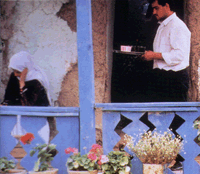A director, played by an actor (Mohamad Ali Keshavarz), speaks in aside about a real-life devastating earthquake in rural Iran. The director has returned to the village of Koker to work on a new film (an actual Kiarostami film) entitled Life and Nothing More… (And Life Goes On…). The young women have been assembled for an open field casting call. A young woman named Tahereh Ladanian is the first person to catch the director’s eye. The director instructs his assistant, Mrs. Shiva (Zarifeh Shiva), to take down her name. Later, we see that the young woman has been cast for the role of a new bride named Tahereh.
Mrs. Shiva drives around the village on the following morning in preparation for the day’s shoot. She goes to Tahereh’s house, where the stubborn young woman insists on wearing an inappropriate party dress for the shoot. Another stop near the makeshift tent school, and two boys provide houseplants for the exterior shots of the house. The initial film takes prove to be a disaster. The leading man, who stutters in the presence of women, is unable to deliver his lines. Mrs. Shiva is asked to bring his replacement, an unemployed mason named Hossein (Hossein Rezai), to the set. But Hossein’s arrival proves to be an equally frustrating challenge for the crew. Tahereh refuses to speak to Hossein, and the director sends the actors home in order to assess the situation. Hossein reveals to the director that he has repeatedly proposed to Tahereh, but her family refuses to give their consent. If she would only provide a sign to show how she truly felt about him.
By defining the role of cinema as a chronicle of real life, Kiarostami takes on the role of documenter rather than director. In Through the Olive Trees, it is the director (albeit played by an actor) who serves as the interviewer, from the school children watching behind the barricades, to the dialogue with Hossein attempting to understand Tahereh’s silence, to the encounter with three generations of provincial women returning from their bath. In depicting the everyday lives of ordinary people through mundane conversations and unremarkable actions, he attempts to capture the essence of the human soul in a way that is honest and contemplative. But in the process of conveying life in real-time, his films can also test one’s patience. In Through the Olive Trees, the director shuts off the camera, only to find that the lives of his actors are far more fascinating off-camera than the characters that they portray on camera. In the remarkable, long, static shot that has come to define Abbas Kiarostami’s signature ending, Hossein, unwilling to accept Tahereh’s continued silence, follows her down the hill, through the olive trees, and into the open field, pleading his case for marriage. The camera lingers as the “couple” are reduced to floating white dots that seem to focus and disperse into the beautiful, earthy landscape. It is a hypnotic reflection of the passage of real-time, and we are reminded that we have witnessed one mere episode, one fleeting glimpse, of a wondrous phenomenon called life.
© Acquarello 2000. All rights reserved.
